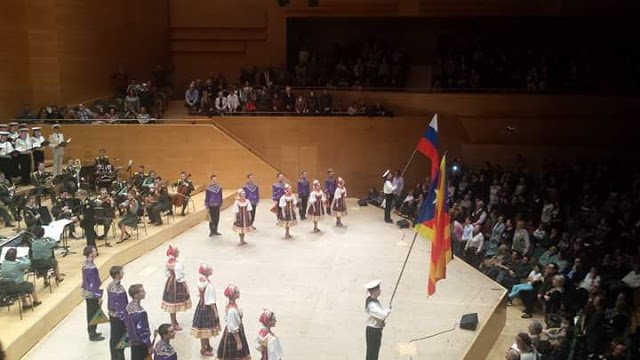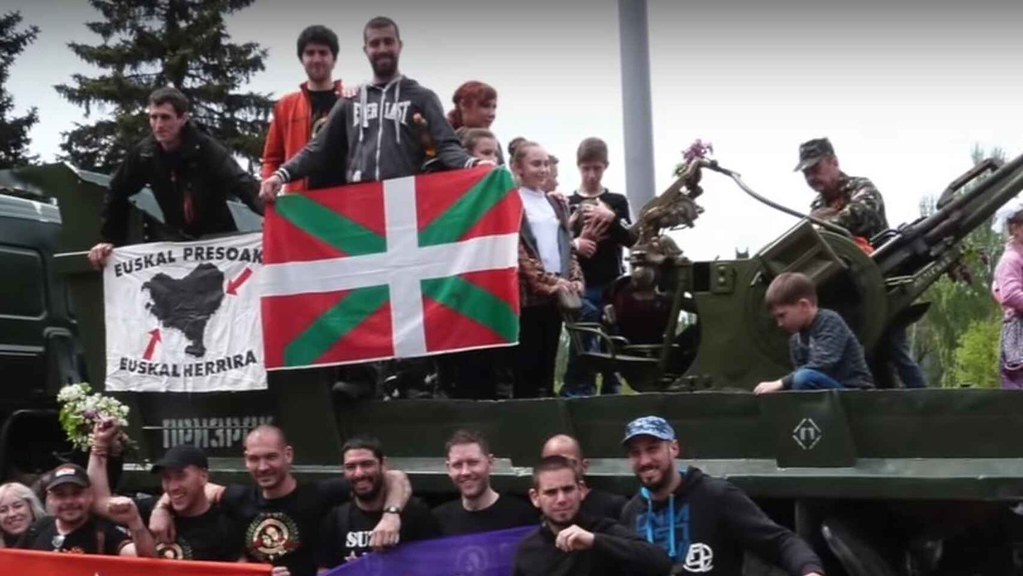Russia's support for separatism in Spain and the support of Spanish separatists for Russia
The Russian invasion of Ukraine is receiving the support of separatist groups from various parts of Spain, a separatism fueled by Russia for years.
The falsehood that Russia takes revenge for the Spanish presence in Latvia since 2017
Spanish fans of Putin believe they see in Russia a desirable ally for Spain. The reality is that Russia has been trying to destabilize Spain for years, supporting far-leftist groups and also separatist organizations. Some pro-Russian Spaniards, who claim to be "patriots", have justified these Russian attempts to destabilize Spain by claiming that it is the Russian response to the presence of Spanish troops in Latvia. The reality is that Spain did not deploy troops in Latvia until July 2017, a deployment motivated by the Russian invasion of Crimea in 2014 and the consequent risk to the security of the Baltic republics.
In 2014 the president of Putin's party equated Catalonia with Crimea
The Kremlin's support for separatism in Spain began before that. On March 6, 2014, Sergey Neverov, secretary general of United Russia (Putin's party) and deputy chairman of the Russian State Duma, gave the example of Catalan separatism as an argument to justify Russia's annexation of Crimea: "Why Crimea can not get out of Ukraine? Catalonia is going to withdraw from Spain", he stated, referring to the illegal separatist referendum that separatist parties such as CiU and ERC were already trying to organize at that time.
In 2015 Catalan separatists were invited to an event supported by the Kremlin
On September 16, 2015, The Moscow Times reported on the attendance of Catalan separatists at a separatist summit sponsored by the Kremlin in Moscow, an event organized under the pretext of “anti-globalization” and in which they expressed the "full right to declare its self-sufficiency and independence from other states". Solidaritat Catalana per la Independència (SCI), a party created in 2010 by Joan Laporta (former president of Fútbol Club Barcelona and previously linked to other separatist parties, such as CiU and ERC), Alfons López Tena (also a former member of CiU) and Uriel Bertrán (former member of ERC), came from Catalonia. In a clear attempt to sow discord in Spain, Russia had invited other Catalan and Basque separatist parties to this event.

In 2016 the Russian Army Choir displayed a separatist flag in Barcelona
On January 2, 2016, the Russian Army Choir gave a concert in Barcelona. At the end of the event, the choir sang the anthem of Catalonia, but not the National Anthem of Spain, while one of its members displayed a Catalan separatist flag, to the chagrin of many of the concertgoers. The Catalan blog Dolça Catalunya organized a mailing of protest letters to the Russian ambassador for this.

In 2016 Moscow again invited Catalan separatists to a meeting
A few months later, in September 2016, the Catalan separatists of SCI were once again invited to the Kremlin-funded meeting of separatists in Moscow, this time under the title "The dialogue of nations. The right of peoples to self-determination and to build a multipolar world". In November 2016, the Russian group organizing this event financed by the Kremlin published a document stating that Catalonia is a "nation" and assuming the proposals of the Catalan separatists. Paradoxically, in 2014 Russia had introduced a reform in its criminal code to punish all separatist demonstrations in that country with up to 5 years in prison.
Russian interference in Spain in the face of the 2017 separatist coup
A year later, this Russian interference in Catalonia took the form of a meeting between an emissary of Putin and leaders of Catalan separatism one day before the separatist coup of October 1, 2017. During the meeting, and as we saw here, the emissary Putin offered the separatists economic aid and 10,000 Russian soldiers to support this attempt to break the unity of Spain. At the same time, the Kremlin's propaganda media unleashed a propaganda campaign against Spain, demonizing it in a similar way as they did with Ukraine at the time and even equating it with this country, affected by pro-Russian separatist movements supported by the Kremlin.
2022: Separatists return Russia's support
A considerable part of the Spanish separatist groups maintain positions of affinity towards Russia because they are groups of the extreme left. As an example, on February 24, 2022, the same day that the Russian invasion of Ukraine began, the far-left Galician separatists of the BNG issued a statement criticizing NATO but not Russia. On January 28, that same separatist organization had published a statement on the Russian military mobilization on the borders with Ukraine: the note attacked the US, calling it "imperialist", and NATO, which it accused of being "aggressive", but not Russia, and assumed the arguments of the Kremlin, accusing the Atlantic Alliance of the military "escalation" initiated by Russia a few months earlier.
The same position has been adopted by the Basque separatists of Bildu, a partner of the BNG and who is accused of being the heir of ETA for its rejection of any condemnation of the more than 800 murders committed by that terrorist group. As soon as the Russian aggression against Ukraine began, Bildu blamed NATO and Ukraine itself for the invasion. A few days later, it refused to support the condemnation of the invasion in the European Parliament. Likewise, it rejected the sending of Spanish military aid to Ukraine and voted against European sanctions on Russia.
Likewise, on February 24, the Catalan separatists of ERC, partners of BNG and Bildu, asked the Spanish government not to join "any military action" in response to this Russian aggression against Ukraine and also rejected the sending of military aid to those attacked. It should also be noted that ERC and Bildu have been behind the pressure campaign on the Pedro Sánchez government that has led to the decapitation of the Spanish intelligence service in the midst of the European crisis caused by the Russian invasion. In addition, they have also taken advantage of the government's weakness to gain access to the Official Secrets Commission of Congress, so that the secrets of the Spanish intelligence service can be known by Putin's puppets in Spain.
The most pro-Russian separatist groups in Spain
Likewise, separatist groups that openly support Russia operate in several Spanish regions. As an example, in Galicia there is the "Galician Committee for the Support of Donbass", whose emblem combines the Russian ribbon of Saint George with the Galician separatist flag:

This group not only displays pro-Russian symbols on its Twitter account, but also places banners emphasizing the "Z" used by the invading Russian army on its vehicles. Under these lines, you can see a banner of his in tribute to the Soviet Army.

Among the Galician separatists who support Russia, not only Russian flags combined with the Galician separatist flag are displayed, but also communist flags, as in the following case:

One of the Galician separatist and communist groups that openly supports Russia is "Agora Galiza", which on April 23 published a pamphlet openly defending the Russian invasion of Ukraine in which it combines communist and anti-Semitic verbiage: "The legitimate Russian intervention in Ukraine modified the agenda of Anglo-Yankee-Zionist imperialism, detonating the imposed rules of the game", they affirm. A statement that any Nazi could sign without changing a comma.
In the Basque region there is also the "Euskal Herria Donbass Committee", also with an openly separatist and communist ideology:

This group combines pro-Russian paraphernalia with far-left Basque separatist paraphernalia, as can be seen in this photo posted on their Facebook page.

That page also includes images related to Catalan separatism, like this one.

In November 2016 it was news in Spain that a separatist convicted of assaulting two civil guards and their girlfriends in Alsasua (Navarra) went to Donbás on a support trip, taking this photo there in which the typical banner of support for ETA prisoners.

What is inexplicable is that there are people who support the unity of Spain and at the same time support Russia, which has been supporting the separatist movements that seek to break the unity of Spain, movements that now return the support provided to Russia.
|
Don't miss the news and content that interest you. Receive the free daily newsletter in your email: Click here to subscribe |
- Most read
- The 'hole' without civil flights around Paris during the opening of the Olympic Games
- Spain vetoes the Russian frigate 'Shtandart', which intended to reach Vigo, in all its ports
- The interior of the Statue of Liberty torch and the sabotage that canceled its visits
- The ten oldest national flags in the world that are still in use today
- The Russian intelligence document that sparked a hoax about French troops
- The BNG boasts of the support of a terrorist group and a dictatorship at a public event
- A virtual tour of ancient Rome in full color, just as it was in its heyday

 ES
ES






Opina sobre esta entrada: